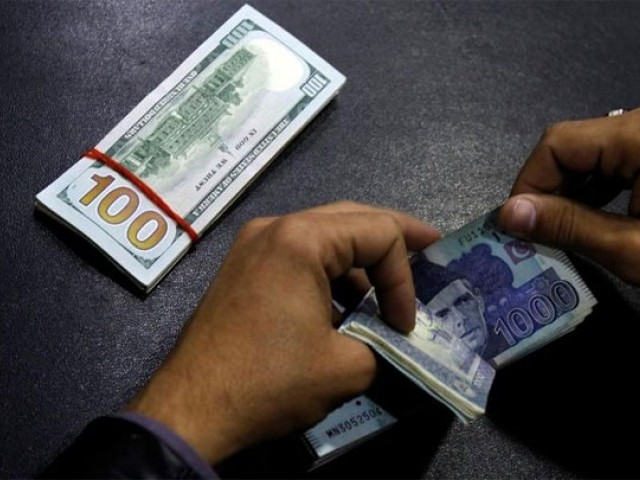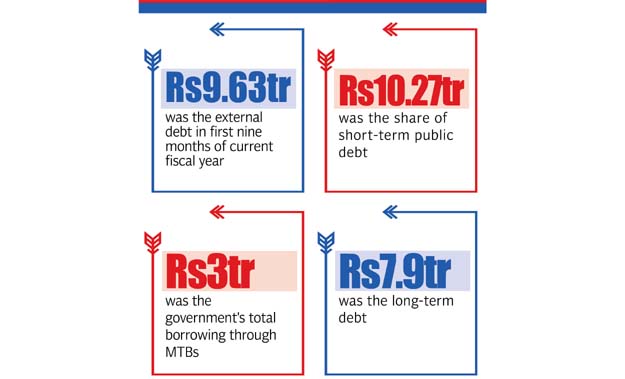Public debt surges Rs3.6tr to a hefty Rs27.8tr
Increase is not in line with PM’s promise to reduce debt pile by the end of his term

Increase is not in line with PM’s promise to reduce debt pile by the end of his term. PHOTO: REUTERS
The central government's debt grew at a pace of 14.8% from July through March of this fiscal year, reported the State Bank of Pakistan (SBP) on Friday. The double-digit growth in the debt stock would not bode well for the government of Prime Minister Imran.
From July through March 2018-19, the government on an average added Rs13.2 billion a day to its debt, which included almost seven and a half months of Pakistan Tehreek-e-Insaf (PTI) government.
Pakistan's debt worth $27b to mature in two years: IMF
The accumulation of debt is the direct result of the gap between expenditures and revenues, which is widening due to the inelasticity in debt servicing and defence needs and the Federal Board of Revenue's (FBR) failure to enhance revenue collection.
In the first nine months of the current fiscal year, the FBR suffered a shortfall of Rs300 billion in revenue collection, which further widened to Rs345 billion at the end of April. The FBR's tax collection grew at a pace of slightly over 2%, which should also be a concern for PM Imran.
A source in the Prime Minister's Office told The Express Tribune that senior level changes in the FBR were expected soon.
During an interaction with media persons over a month ago, the prime minister had said that he planned to bring down the debt stock to Rs20 trillion from what he claimed Rs30 trillion at the end of June 2018.
The premier on Wednesday again blamed the governments of the Pakistan Peoples Party (PPP) and the Pakistan Muslim League-Nawaz (PML-N) for increasing the public debt to Rs30 trillion.
Imran's claim that the PML-N left the public debt at the level of Rs30 trillion is factually incorrect, as the SBP record showed that the gross public debt by June 2018 was Rs24.2 trillion, said former finance minister Ishaq Dar on Thursday.

Dar also said that the PM gave a false statement by claiming that the gross public debt would be brought down to Rs20 trillion. The figures that PTI government shared with the International Monetary Fund (IMF) showed that the gross public debt would jump by another Rs11 trillion to Rs36 trillion within three years, said Dar.
The international financial institutions and the Ministry of Finance do not see a sharp reduction in the debt level that even as percentage of Gross Domestic Product would remain above 70% of GDP by 2023.
The external debt of the central government increased 23.5% to Rs9.63 trillion in first nine months of the current fiscal year. There was a net increase of Rs1.83 trillion in the external debt, largely due to currency depreciation and fresh external borrowings.
In June 2018, the value of a dollar was equal to Rs121.54, which reached Rs140.7 to a dollar by the end of March, according to the central bank.
The Rs9.63-trillion external debt does not include loans of $9.2 billion obtained from China, Saudi Arabia and the United Arab Emirates. Those loans are the responsibility of the central bank.
The ballooning public debt remains a concern due to the previous government's inability to attract non-debt creating inflows and enhance tax revenues. The PTI government is also struggling to enhance exports despite around 35% depreciation of rupee since December 2017.
The most worrisome aspect was the continued growth in the short-term domestic debt, which exposed the government to refinancing and interest rate risks. The federal government's total domestic debt increased to Rs18.24 trillion, an addition of Rs1.8 trillion or 10.7% in nine months of the current fiscal year.
The share of short-term public debt slightly decreased to 56.2% or Rs10.27 trillion by the end of March. In June last year, the short-term domestic debt stood at 54.1% or Rs8.9 trillion. The short-term debt grew Rs1.4 trillion or 5.5% in nine months.
Foreign exchange: SBP reserves dip 2.4% to stand at $8.8b
In the first nine months of the current fiscal year, the federal government's debt acquired through Market Treasury Bills (MTBs) from commercial banks massively decreased after it shifted financing to the central bank. The government's total borrowing through MTBs decreased Rs2.3 trillion to Rs3 trillion. The MTBs issued to borrow from the central bank rose to R7.24 trillion, a net addition of Rs3.64 trillion or 101% from July through March.
The retirement of the central bank debt is an outstanding issue during ongoing talks between Pakistan and the IMF.
The long-term debt, which was earlier shrinking, also went up 5% to Rs7.9 trillion. The debt contracted through National Saving Schemes increased by 8.2% to Rs3 trillion as of end March.
Published in The Express Tribune, May 4th, 2019.
Like Business on Facebook, follow @TribuneBiz on Twitter to stay informed and join in the conversation.




1733130350-0/Untitled-design-(76)1733130350-0-208x130.webp)













COMMENTS
Comments are moderated and generally will be posted if they are on-topic and not abusive.
For more information, please see our Comments FAQ